SWEDISH SOUTH ASIAN STUDIES NETWORK
Lars visit to Bhubaneshwar, Orissa, 15–17 December 2005
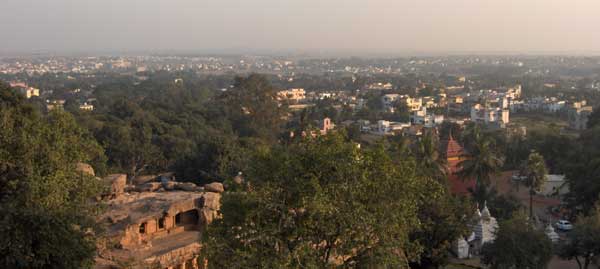 While
Staffan travelled to Patna Lars went to Bhubaneshwar, capital of the state
of Orissa, 500 km southwest from Kolkata. A state also known under its
old historic name Utkal, that means Land of superior culture, which is
a quite appropriate name for a region full of the most exquisite temples
from the Kalinga dynastic era, where art and architecture plays a vital
role even today.
While
Staffan travelled to Patna Lars went to Bhubaneshwar, capital of the state
of Orissa, 500 km southwest from Kolkata. A state also known under its
old historic name Utkal, that means Land of superior culture, which is
a quite appropriate name for a region full of the most exquisite temples
from the Kalinga dynastic era, where art and architecture plays a vital
role even today.
Besides the dominant Oriya culture the state also boasts of a large variety of strong tribal cultures, constituting 22 % of the population. It is also a land full of poets; poetry seems to be a part-time occupation among most university professors, medical doctors and civil servants.
At the Netaji Subhas Chandra Bose Airport in Kolkata almost every plane scheduled for departure from the domestic airport during the afternoon was delayed, according to information given on the screens. With one happy exception, namely the Indian Airlines flight to Bhubaneshwar, that left exactly on time and also reached its destination after only 50 minutes. A nice flight over the river delta lands of Sundarbans, a short hop over the Bay of Bengal, and finally passing over the fertile plains of northern Orissa.
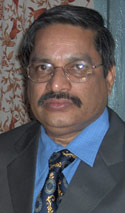
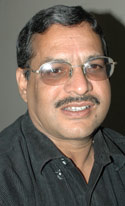 My
local hosts, Mr. Aswini
K Mishra (photo to the left), senior member of state civil
service in Orissa, now project director for the District Rural Development
Agency in Jharsuguda, and Dr. Jugal
K. Mishra (photo to the right), Associate Professor, Dept.
of political science, B.J.B. Autonomous College, Bhubaneshwar, had come
to the airport to receive me. They had kindly organised all arrangements
and meetings during the stay in Bhubaneshwar, and also took me around
to visit interesting places in the city and the surrounding countryside.
My
local hosts, Mr. Aswini
K Mishra (photo to the left), senior member of state civil
service in Orissa, now project director for the District Rural Development
Agency in Jharsuguda, and Dr. Jugal
K. Mishra (photo to the right), Associate Professor, Dept.
of political science, B.J.B. Autonomous College, Bhubaneshwar, had come
to the airport to receive me. They had kindly organised all arrangements
and meetings during the stay in Bhubaneshwar, and also took me around
to visit interesting places in the city and the surrounding countryside.
Aswini Kumar Mishra, who is also acknowledged as a poet of eminence in
Orissa, convened Panel No. 4 on ”The voice of Dalit in South
Asian Literature” (more information
about the panel) in the 18th ECMSAS conference in Lund in July 2004,
a conference organised by SASNET. Jugal K Mishra also participated in
the same panel.
Book release function
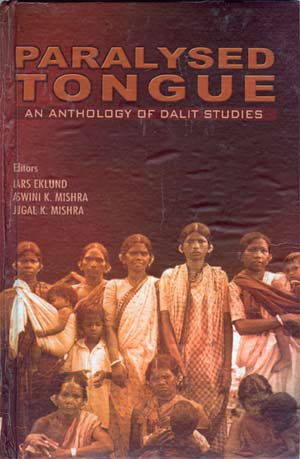 Lars
had been invited to attend a book release function at Swosti Hotel in
the morning of 16 December 2005. The book, ”Paralysed Tongue.
An anthology of Dalit studies” (Pagemaker, Bhubaneshwar, 2005)
incorporates several papers presented in the Lund conference panel on
Dalit Literature, and has been edited by Aswini Kumar Mishra and Jugal
K Mishra. The book deals with Dalit literature not only in different parts
of India, but also covers the other South Asian countries, including Nepal,
Bangladesh, Pakistan and Afghanistan. As a token of thanks to the organisers
of the Lund conference Lars Eklund’s name was also mentioned to
be one of the book editors, and Lars was given the task to formally release
the book.
Lars
had been invited to attend a book release function at Swosti Hotel in
the morning of 16 December 2005. The book, ”Paralysed Tongue.
An anthology of Dalit studies” (Pagemaker, Bhubaneshwar, 2005)
incorporates several papers presented in the Lund conference panel on
Dalit Literature, and has been edited by Aswini Kumar Mishra and Jugal
K Mishra. The book deals with Dalit literature not only in different parts
of India, but also covers the other South Asian countries, including Nepal,
Bangladesh, Pakistan and Afghanistan. As a token of thanks to the organisers
of the Lund conference Lars Eklund’s name was also mentioned to
be one of the book editors, and Lars was given the task to formally release
the book.
It was a well-attended meeting, with two university vice-chancellors (Dr. Lakshmi Narayan Mishra from Utkal University, and Dr. S.C. Panda from Utkal University of Culture) and a large number of university teachers, journalists, poets and other representatives of the Bhubaneshwar literati being present. The poet Rajendra Kumar Panda held a speech as a guest of honour, pointing out that several important Oriya poets have been dalits. The translator Aurobindo Behera also held a speech, and finally Lars gave a short recapitulation of the conference held in Lund, and the interaction between the book editors and SASNET preceding the publishing.
Some university teachers were eager to have a chat about SASNET and Sweden afterwards. Among them Professor Himansu S. Mohapatra from the Dept. of English, Utkal University, and Alakananda Mishra, lecturer at the same department. Prof. Mohapatra has a relation to Sweden, as he for brief periods from 2000 to 2002 was a guest professor at Södertörn University College south of Stockholm, and also visited Lund University.
Another person who turned up was Dr. Manorama Biswal Mahapatra, Head of the Dept. of Oriya, BJB Autonomous College. Dr. Mahapatra, educated at Vishwa Bharati University in Shantiniketan, is currently working on a research project on Tribal folklore in Orissa, and she visited Sweden in the Summer 2003 to participate in an International Conference on Folklore, organised by the University of Gotland in Visby. She is also a reputed writer of children‘s literature, and several of her books have been translated into other Indian languages. Dr. Mahapatra approached me and asked whether there could be an interest in Sweden for translations of her works into Swedish as well. I informed her about the ongoing Indo-Swedish Translation project, led by Mr Tomas Löfström, see http://www.sasnet.lu.se/indlibrary.html.
Visit to Utkal University of Culture, Friday 16 December 2005
Web page: http://www.utkaluniversityculture.org/
The Utkal University of Culture came into existence in 1999. It was set up in order to preserve, promote, propagate and protect the richness of the cultural heritage in Orissa by way of making substantive accomplishments through study, research, documentation and continuing education.
The university is still small, with only 2000 students and eight departments, offering undergraduate, MA and postgraduate courses in:
• Culture studies (including tribal studies and gender studies)
• Sociolinguistics
• Orissan studies
• Jainist and Buddhist studies (with a Jaina Chair professorship,
instituted with a grant from the Ministry of Culture, Government of India)
• South and Southeast Asian studies
• Cultural Heritage and Conservation
• Tourism and Hospitality services
• Performing arts (including Odissi dance training)
The university also has a Tamil Chair, instituted by a grant from the Government of Tamil Nadu.
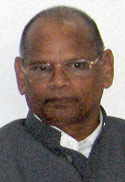
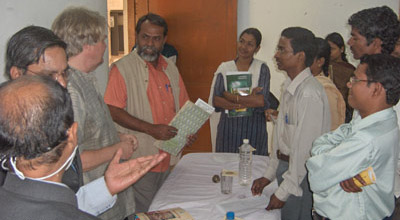 A
meeting had been organised by the Vice Chancellor Dr. S.C.
Panda (photo to the left). Teachers and students from
most departments turned up and listened to a presentation about SASNET. They
also informed about the present situation at the university, where guest
lecturers contribute with most of the teaching. The number of permanent
staff is limited, and this is something they want to change in order to
strengthen research.
A
meeting had been organised by the Vice Chancellor Dr. S.C.
Panda (photo to the left). Teachers and students from
most departments turned up and listened to a presentation about SASNET. They
also informed about the present situation at the university, where guest
lecturers contribute with most of the teaching. The number of permanent
staff is limited, and this is something they want to change in order to
strengthen research.
As it is a very young university only few PhD’s have come out so
far. The departmental organisation differs from traditional Indian universities,
for example by keeping sociology not as a separate discipline, but instead
integrating it into other departments such as sociolinguistics and culture
studies.
The university is also active in organising multidisciplinary seminars
on issues important for Orissa, for example a seminar on ”Tribal
Culture in Transition”, organised in 2001.
Utkal University of Culture is also much interested in research collaboration
with institutions in countries like Sri Lanka, Malaysia and Indonesia
(especially Bali) since Orissa have had cultural contacts with these countries
for more than 2000 years. Previously a guest professor from Sri Lanka
worked at the university, and currently some students from Vietnam participate
in courses.
There is also a Swedish link. Currently there is one Swedish student in
the Dept. of Performing arts, and another one trained Odissi dance in
the same department a couple of years ago.
Teachers present at the meeting:
• Dr. Gopalandhe Mohanty,
Lecturer at the Dept. of Sociolinguistics and Head of all postgraduate
departments
• Girija Shankar Bal, Dept. of South
and Southeast Asian studies
• Prashant Kumar Maharana, Lecturer
in Orissan studies
• Nikanja Kishore Jena, Dept. of Cultural
Heritage and Conservation
• Manoj
Mishra, Faculty cum course co-ordinator, Dept. of Tourism and
Hospitality services
• L.C. Jain, Jaina Chair Professor,
Dept. of Jainist and Buddhist studies
• Dr. M.P. Mohanty,
co-ordinator, postgraduate departments of Culture studies & South
and Southeast Asian studies
• Dr. Anita Mishra, co-ordinator, Dept.
of Cultural Heritage and Conservation
Visit to Post-Graduate Department of Sociology,
Utkal University,
Friday 16 December 2005
Utkal University web page: http://www.utkal-university.org/
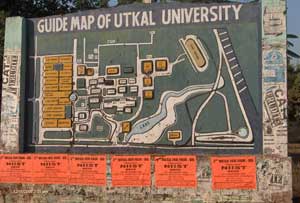 Utkal
University was established in 1943, and is located in a large campus west
of the National highway no 5 (connecting Kolkata with Chennai). It is
a teaching-cum-affiliating university, with 43 postgraduate departments
within the fields of science, humanities, business administration, social
science, law and commerce.
Utkal
University was established in 1943, and is located in a large campus west
of the National highway no 5 (connecting Kolkata with Chennai). It is
a teaching-cum-affiliating university, with 43 postgraduate departments
within the fields of science, humanities, business administration, social
science, law and commerce.
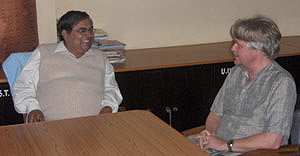 It has approximately 5 000 postgraduate students and a staff of 250 teachers.
Besides it is the largest affiliating university in India, with today
310 affiliated colleges under its jurisdiction.
It has approximately 5 000 postgraduate students and a staff of 250 teachers.
Besides it is the largest affiliating university in India, with today
310 affiliated colleges under its jurisdiction.
The university is involved in many collaboration projects with foreign universities, and non-resident Indians (NRI) play a vital role in funding Utkal University, according to the Vice Chancellor Dr. L.N. Mishra, with whom I had a short meeting in his office room in the afternoon (see photo to the right).
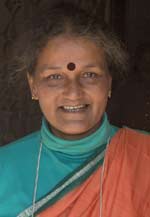
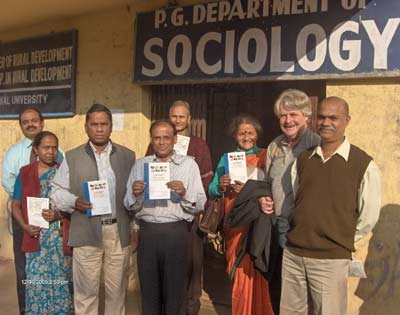 Otherwise
time permitted only one meeting at the university, and that was organised
by Professor Rita Ray (photo
to the left) at the Dept. of Sociology.
Otherwise
time permitted only one meeting at the university, and that was organised
by Professor Rita Ray (photo
to the left) at the Dept. of Sociology.
The department has eight teachers and 150 students at MA, MPhil and PhD
levels (25 of them on PhD level). It focuses on research in three fields,
namely development, gender and tribal studies, all of them with enormous
relevance for Orissa.
The Sociology department is involved in research collaboration with the
University of Osnabrück in Germany, and has previously also worked
with colleagues in Canada and USA. Prof. Ray herself is doing socio-economic
research on resettlement and rehabilitation in connection with development
projects.
Almost all the teachers at the department turned up for the meeting
to listen to my presentation about SASNET and possibilities to find research
partners also in Sweden.
• Professor B. Pathak
• Professor Anup Dash
• Professor D.N. Jena
• Balgovind Baboo
• Bijay Behera, lecturer
• Dr. Mary Gabriela Bage
Meeting with Prof. Emeritus Lars Henrik Ekstand, Friday 16 December 2005
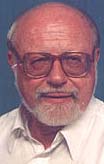
Lars Henrik Ekstrand retired
as professor at Lund University’s School of
Education (in Malmö) in 1996. From 1980 onwards he has spent
long time in Bhubaneshwar, doing research and also working with development
projects. Since retirement he spends half the year in Orissa with his
wife Rita Ray, Professor of Sociology at Utkal University, and the other
half in Sweden. He is still active in research, and has published material
on development theory and corruption. See http://www.sasnet.lu.se/educmalm.html
I was invited to their house located seven km away from the city centre,
close to the newly constructed Infocity (home for one of the Indian IT
giant Infosys’ production centres). We had a nice evening with discussions
and mixed Indo-Swedish food. A nice way to wind up the 2005 contact journey
to South Asia.
A senior correspondent from Times of India, Sandeep
Mishra, based in Bhubaneshwar, was also invited for the evening,
in order to make an interview about SASNET.
SASNET - Swedish South Asian Studies Network/Lund
University
Address: Scheelevägen 15 D, SE-223 70 Lund, Sweden
Phone: +46 46 222 73 40
Webmaster: Lars Eklund
Last updated
2008-09-29
